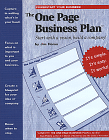When is the last time you reviewed your business plan? Do you even HAVE a business plan? Many businesses sprout from someone's "good idea", by an entrepreneur who either didn't know about business plans, or simply didn't have the time to complete one.
While the idea of a business plan may seem overwhelming at first, many businesses end up hitting that wall when it's time to expand or they need financing. Anyone who wishes to attract funding quickly understands that without a business plan, commercial lenders won't even talk with you.
Yet business plans serve a much larger purpose, too. They allow the owner to really understand their business. Developing the plan requires a certain amount of research into the general industry as well as the business itself. Delving into the intricacies can give the business owner a new perspective on what's working and what needs to be improved in their own business. It also helps identify new or unexplored trends in the industry. New ideas and possibilities pop up when you are clear about what works.
There are several good software packages that can help you develop your business plan or you can simply start with a good business plan outline of categories and "fill-in-the-blanks". Either way you will be broadening your understanding of what's possible and probable in your business.
The approach we've taken in most of our "Writing a Business Plan" classes has been to divide the traditional plan into individual parts and focus on each section in turn. Even with the focus and group interaction, few participants were able to complete more than 60-75% of their plans by the end of the 7-10 sessions. Recently, however, I've come across a wonderful new book that takes a slightly different approach.
Using Jim Horan's "One Page Business Plan", I've been able to help one of my coaching clients complete her initial draft of a viable plan in three sessions. Jim Horan is a San Francisco Bay Area small business expert who has taken the complexity of business plans and demystified the process. My client had already done some work on vision and mission, and had a fairly clear idea about what she wanted to create, but she seemed stuck as she struggled to complete the formal business plan.
Jim's book offers several interactive exercises that are more interesting and enjoyable than straight research. The exercises are designed to get you thinking about key elements of your business, from vision and mission through strategies and plans. All the elements are still there, but with the One Page Business Plan(sm) they are simplified down to their essence.
Having the resulting business plan on a single page helps the business owner focus on the essentials of what will make the business work, rather than getting trapped in the verbage that makes up a more traditional plan. And it provides a document that can start the dialogue with bankers or venture capitalists.
My client's response to the One Page Business Plan? Now she's excited about her business again – she sees that it's doable, she has specific milestones to aim for, and best of all, a plan that will help her focus!
Whatever your approach, taking the time to develop your plan more fully will help you refocuse on your strengths and remember your vision. Whether you are starting a new business or expanding an existing one, a well thought-out business plan will add to your success.
_____For More Information_____
Contact the Career Life Institute to find out more about small business coaching, our Biz Plan In a Week Program and other upcoming classes.
©2000 Katie Darden, Career Life Institute
This book is available at Amazon.com. Click below to find out more:

The One Page Business Plan – Start with a Vision, Build a Company
– James T. Horan, Jr.
